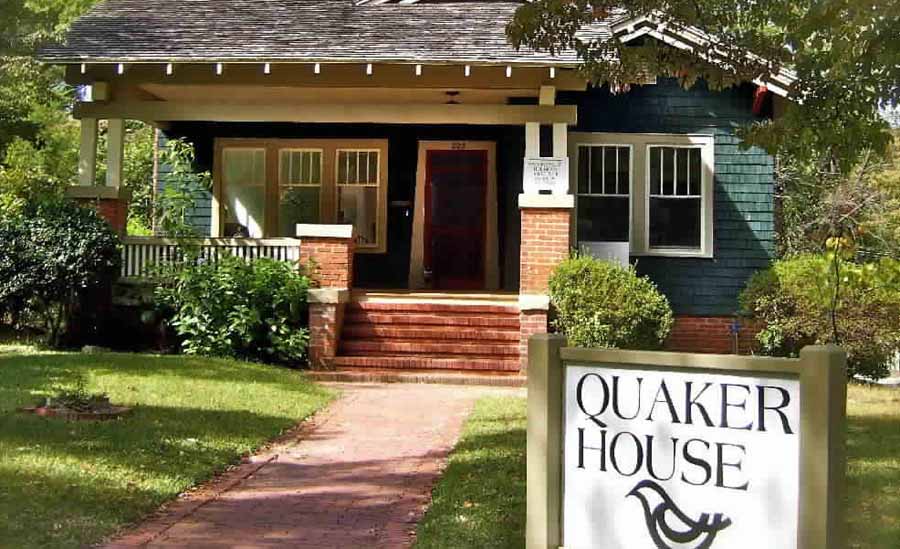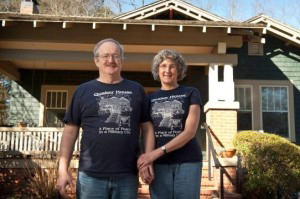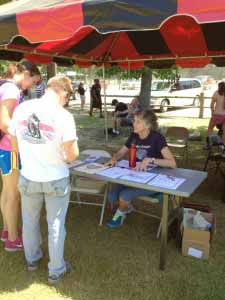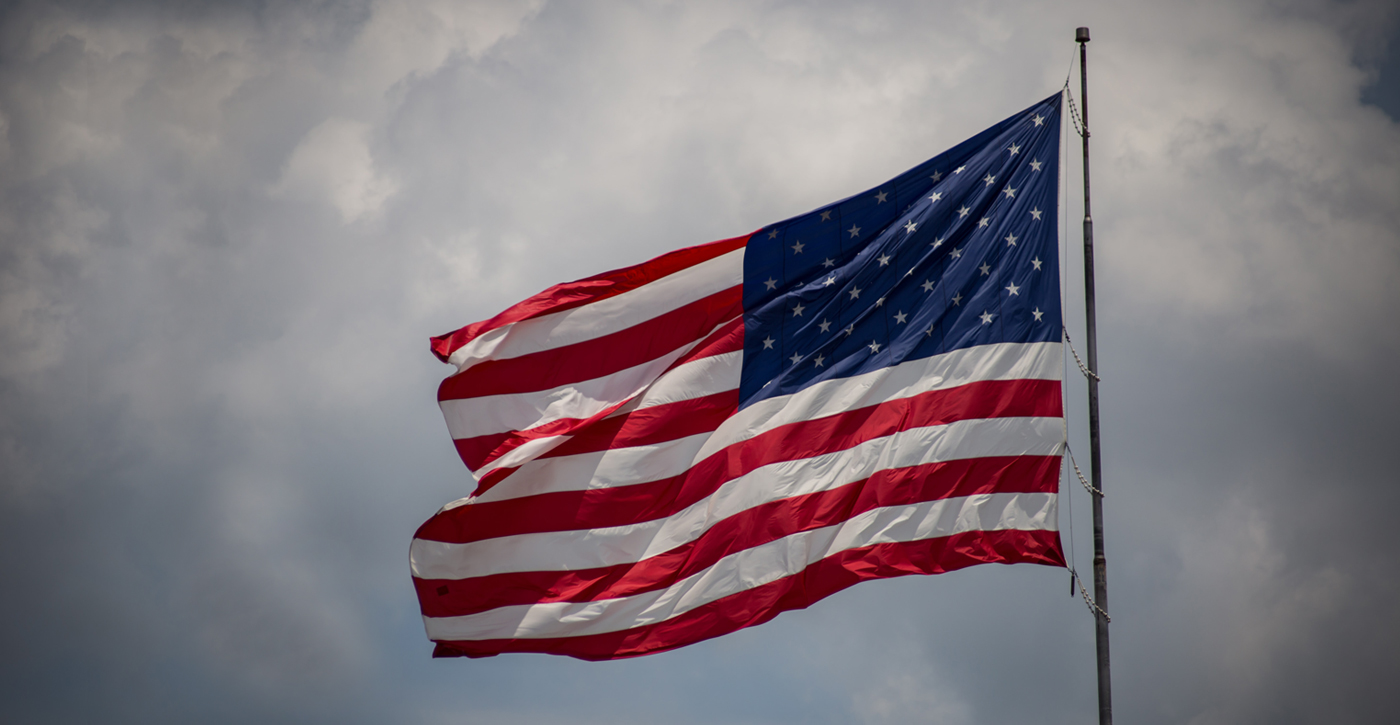A Place of Peace in a Military City

In 1970, as a student at the University of North Carolina at Chapel Hill, I was drawn to Quakers. Every Wednesday, on the town’s main street, I witnessed a long line of beautiful people holding a vigil to oppose the war in Vietnam. Many of them were Quakers, and soon I began joining them in their vigils and then in their meetings for worship. Not long after, the Chapel Hill (N.C.) Meeting asked me to serve on the board of a new mission in Fayetteville (home of Fort Bragg) called Quaker House. One of its founders, Bob Gwyn, drove me to Fayetteville where we witnessed the hardships service members were facing. After graduating and moving away, I found that Quaker House stayed in my thoughts.

In 2003, my husband, Steve, and I moved to Charlotte, North Carolina, where we became members of the Charlotte Meeting. During a meeting work day, a member of the Nominating Committee lamented the difficulty of finding someone to serve on the board of Quaker House. Immediately, I knew that I wanted to do it and that my husband would be interested, too. As a veteran, Steve worked to help soldiers upgrade their discharges. During our service on the board, we were deeply moved by the commitment of the board members and the director, Chuck Fager.
In 2011, as Chuck approached his retirement from Quaker House, I volunteered to be on the search committee for a new director. I began calling and emailing all my friends who I felt would be perfect for the job. Suddenly it hit me. Steve and I could and should take on the position. I ran to the kitchen and announced to Steve, as he sat peacefully with his tea, that we would be perfect for the job. “What job?” he replied.
I was retiring (for the second time) from my art teaching career. Steve was worn out with his work remodeling homes. We both had been involved in peace activities throughout our lives and felt a deep empathy for our service members. Once we decided to apply for the job, we never looked back, though occasionally we would ask each other if we were sure this was the right path for us. Our friends and family worried about our making such a major change in our lives, but we were steadfast. We were living in a home with approximately 3,000 square feet of space and furniture and had to downsize for the modest Fayetteville accommodation. We began selling and giving away most of our stuff. My sister helped me cull through my clothes, giving away at least half of them.
Our house sold to the first people who looked at it. We spent the summer of 2012 in transition, going to conferences and retreats, introducing ourselves as the next directors, and spending time with Chuck learning the ropes of directing the activities of Quaker House. Chuck advised us of work we might want to concentrate on. He emphasized the high incidence of domestic violence in the military. I thought, “What can I possibly do?”

That first week after moving into the house, I was busy unpacking boxes when the phone rang. “What are you doing about domestic violence?” the woman asked. “Our Peace and Social Justice Committee is meeting, and we want to know whether or not we should include Quaker House in our budget.” As I sat surrounded by boxes, I thought again, “What can I do?”
Several weeks later, without any knowledge of this prior conversation, an anonymous donor approached us with a gift to pay a therapist to work half time to develop and lead a domestic violence victims’ support program for military personnel and their spouses. Do angels exist? This was proof enough for me!
During a special meeting in Fayetteville in which military and civilian behavioral health professionals network with nonprofit organizations to help service members, I announced our donor’s gift. At the break, I was surrounded by people offering help and asking to work with me. I was invited to Fort Bragg to meet with their domestic violence department, to a meeting with the military’s Community Health Promotion Council, and to a spiritual resiliency meeting led by military chaplains. The chaplains asked me to speak about Quaker House. In addition to telling them about our domestic violence program, I gave them samples of the emails and calls we get on our GI Rights Hotline, and they were moved by the pain evident in them. They expressed their support and appreciation for our work.
Service members in need of mental and behavioral health do not want to go to military professionals for help for fear that their careers might be jeopardized. The military is under a great deal of pressure to reduce the number of suicide, domestic violence, substance abuse, and sexual assault cases. Many are grateful for civilian organizations that offer support.
The chaplains also told me how they appreciated our conscientious objection counseling. They felt that service members should be able to leave the military if they wish, especially when their consciences are transformed to oppose war and killing. When I talked about being a pacifist, one of the chaplains commented that Jesus was a pacifist. Recently, they visited Quaker House and said that they were glad to build bridges with us; they felt that we were warm and welcoming.
After many interviews, we found a wonderful director and therapist for the domestic violence program. The daughter of career army parents, she had past experience working for the military as a therapist. Frustrated by the difficulties she encountered trying to help her clients in the military, she left that work and opened her own office. She is thrilled to have such a supportive environment where she can truly help the victims of domestic violence.
Our program grows slowly, but surely. Other Quaker House activities bring clients to us. For example, with the Fayetteville Meeting, we co-sponsored a program on human trafficking that brought two women from the Family Justice Center, a nonprofit that helps domestic violence victims. Since they are not able to offer therapy, they now refer abused military spouses to us. Our program on the Alternatives to Violence Project brought several military victims advocates who now refer clients to us.
There is no doubt in my mind that I was led and continue to be led on this path. So many miracles have happened since we began here. For example, a woman came to the door one day and asked if she could lead mindfulness classes. Additionally, the Wounded Warrior Project began holding a women’s support group at Quaker House after hearing about our domestic violence program. The Behavioral Health Professional Organization asked us to join their meetings and present a program on domestic violence. Also, we were asked to present our program to an entire military unit at a SHARP training (Sexual Harassment/Assault Response and Prevention). That day, I stood on a field and spoke to approximately 400 soldiers about our program as well as our GI Rights Hotline work, and they applauded when I finished. We are now able to post flyers on base that present our domestic violence work and our GI Rights Hotline, whereas previously we were prevented from doing so because we also offer conscientious objection counseling.
What astounds me is how unique we are. Fayetteville is a city with many active, large churches, yet our small house with one full-time and four part-time staff members is one of the few faith communities that is solidly dedicated to providing support for the service members who suffer so severely from fighting our government’s wars. I am committed to calling on faith communities everywhere to educate themselves about the service members’ hardships, to work to help heal the wounds of war, and to offer practical support to military people and their families.
In the Fayetteville community, we are well known, honored, and appreciated by many. In this military city, Quaker House is truly a manifestation of the Friends peace testimony and our commitment to loving that of God in everyone. I am so thankful that I was called to this path. I feel more fully in partnership with God now than I have ever felt in my life.




I’m very disappointed that todays Quaker House doesn’t speak about its history. I was stationed @ bragg in 1968 & 69. While the Quakers definitely gave support it was a active
duty GI that hitched a ride to Chapel Hill & gave birth to Quaker House. I was there when the first building was destroyed by arson. The location of current Quaker House resulted from a Vet getting a gov’t loan to buy it. Thanks Bill Carothers.
We had first ever & several demonstrations against the Viet Nam war & marched in Fayetteville. Maybe our history is on your site & I couldn’t find.Thanks David OBrien
Conscientious Objector
Veteran Drafted
us army